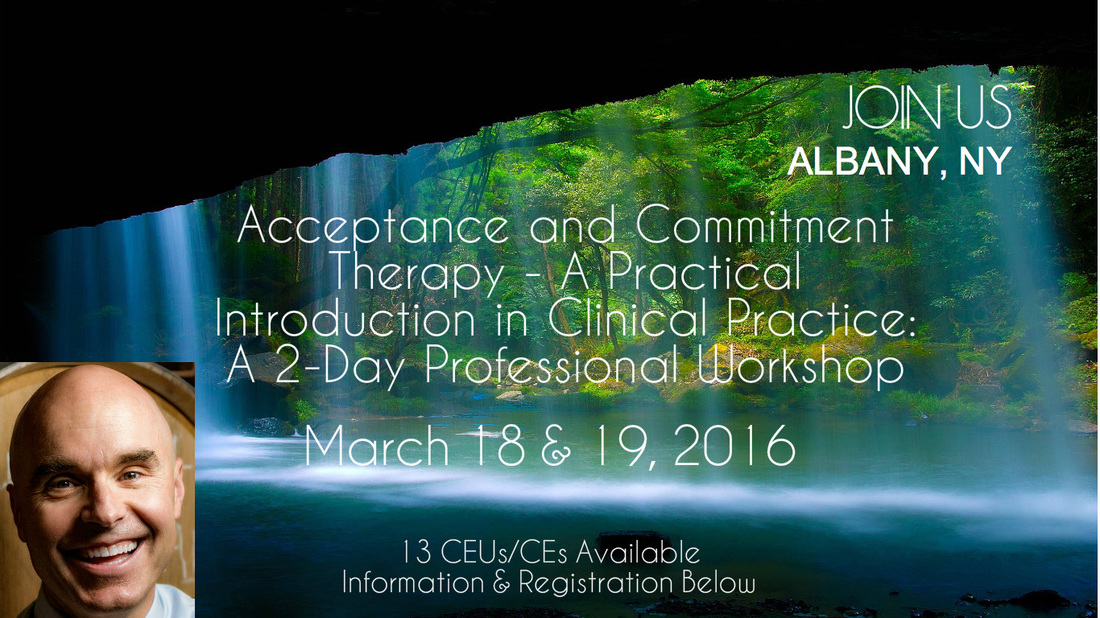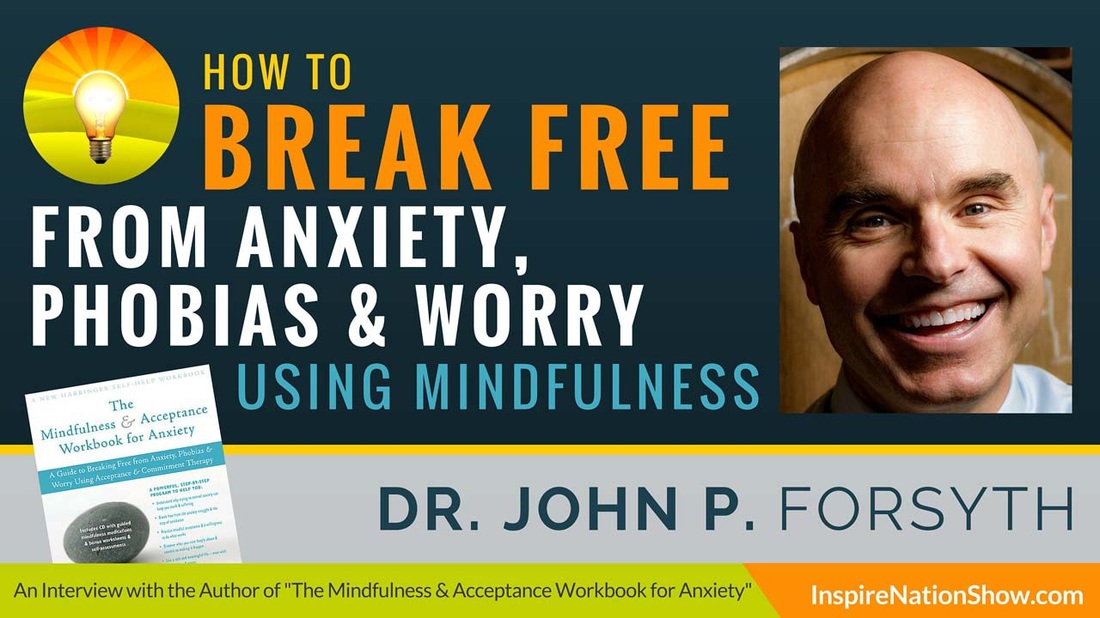Workshop Overview
Acceptance and mindfulness-based practices are rapidly making their way into mental health care, medicine, and society both to alleviate human suffering and nurture psychological health and wellness. This body of work also offers a fresh perceptive on psychological suffering and a set of powerful clinical strategies that support meaningful life changes. In this workshop, we will learn about one particular approach and set of practices based on Acceptance and Commitment Therapy (or ACT, said as one word).
ACT is a newer third-generation evidence-based behavior therapy that balances mindfulness and acceptance processes with commitment and behavior change processes to (a) weaken the unhelpful influence of thoughts and emotional avoidance in guiding actions, while (b) promoting greater experiential and psychological flexibility in the service of (c) valued ends. It is both a form of therapy and an approach to living well, with evidence showing that it is useful for many forms of psychological and emotional suffering. In short, ACT teaches clients how to be with their hurts and do what works – to live well, richly, and meaningfully, without first having to defeat sources of emotional and psychological pain.
This 2-day workshop will introduce ACT, both as a model and intervention technology, and illustrate its use across a broad set of problem areas that are commonly seen in mental health settings (e.g., anxiety, depression, anger). This work can be challenging for both therapists and clients alike, for much of ACT work involves contacting difficult and painful psychological content without defense and for a purpose other than psychological relief. Thus, understanding the application and integration of the ACT model of psychological health and suffering is essential for effective ACT work.
Our time together will be filled with didactic teachings, live and video demonstrations, and practical experiential exercises that will be done individually, in dyads, and small groups. The exercises will highlight the integration of mindfulness and acceptance strategies (along with kindness and compassion exercises) to disarm forms of human suffering and also to promote greater clarity of values and action in the service of living well. Participants will be encouraged (but never forced or coerced) to engage the material at a personal level, as it applies to their own lives, and then also in the context of their clinical work. All we ask is that participants are willing to get inside the ACT model and approach, if only for 2-days. Clinical worksheets and other practical tools will be provided.
ACT is a newer third-generation evidence-based behavior therapy that balances mindfulness and acceptance processes with commitment and behavior change processes to (a) weaken the unhelpful influence of thoughts and emotional avoidance in guiding actions, while (b) promoting greater experiential and psychological flexibility in the service of (c) valued ends. It is both a form of therapy and an approach to living well, with evidence showing that it is useful for many forms of psychological and emotional suffering. In short, ACT teaches clients how to be with their hurts and do what works – to live well, richly, and meaningfully, without first having to defeat sources of emotional and psychological pain.
This 2-day workshop will introduce ACT, both as a model and intervention technology, and illustrate its use across a broad set of problem areas that are commonly seen in mental health settings (e.g., anxiety, depression, anger). This work can be challenging for both therapists and clients alike, for much of ACT work involves contacting difficult and painful psychological content without defense and for a purpose other than psychological relief. Thus, understanding the application and integration of the ACT model of psychological health and suffering is essential for effective ACT work.
Our time together will be filled with didactic teachings, live and video demonstrations, and practical experiential exercises that will be done individually, in dyads, and small groups. The exercises will highlight the integration of mindfulness and acceptance strategies (along with kindness and compassion exercises) to disarm forms of human suffering and also to promote greater clarity of values and action in the service of living well. Participants will be encouraged (but never forced or coerced) to engage the material at a personal level, as it applies to their own lives, and then also in the context of their clinical work. All we ask is that participants are willing to get inside the ACT model and approach, if only for 2-days. Clinical worksheets and other practical tools will be provided.
Learning Objectives
Over the course of two days, participants in this workshop will:
- Define the three pillars of ACT;
- Define each of the six hexaflex components;
- Define the six inflexahex components;
- Explain a functional contextual approach to ACT case conceptualization;
- Describe clinical concerns (e.g., anxiety, depression, problem anger) within an ACT framework;
- Identify exemplars of excessive struggle and avoidance and describe mindful and compassionate alternative behaviors;
- Define and identify “fusion” and “experiential avoidance” and their role in various forms of human suffering;
- Rehearse essential ACT intervention skills to cultivate psychological flexibility;
- Deliver values clarification exercises in dyads and small groups;
- Apply experiential exercises and metaphors in dyads and small groups;
- Discriminate ACT consistent and ACT inconsistent strategies in clinical practice;
- Describe strategies to foster the ongoing development of ACT consistent clinical competencies; and
- Apply and integrate mindfulness and acceptance processes with commitment and behavior change processes in dyads.
Workshop Schedule (13 Hours for CEU/CE Credit)
Day 1 – Friday
8:30 – 9:00 am Registration / Check in
9:00 – 12:00 pm ACT Model and Case Conceptualization
12-1:15pm Lunch – On Your Own
1:15 – 3pm Using Creative Hopelessness to Weaken the Control Agenda
3 – 3:15 pm Break
3:15 – 5:00 pm Doing Effective Values Work in ACT
Day 2 – Saturday
9:00 – 12pm Cultivating Mindful Acceptance & Defusion
12-1:15pm Lunch – On Your Own
1:15 – 5pm Nurturing Self-Compassion, Willingness, and Value-Guided action
8:30 – 9:00 am Registration / Check in
9:00 – 12:00 pm ACT Model and Case Conceptualization
- Centering Exercise
- Why It’s Hard Being Human
- Pervasiveness of Human Suffering
- The Light and Dark Side of Language & Cognition
- ACT Case Conceptualization
- ACT Model of Human Suffering
- ACT Model of Psychological Health
- Self-Assessment Exercise: Eyes On
- ACT in a Nutshell Role Play Demonstration
12-1:15pm Lunch – On Your Own
1:15 – 3pm Using Creative Hopelessness to Weaken the Control Agenda
- Why Creative Hopeless in ACT?
- Exploring Workability
- Establishing Creative Hopelessness
- Exercise and Role Play: Tug of War with Anxiety Monster
- Exercise: Metaphors to Weaken Illusion of Control
- Exercise and Role Play: Chinese Finger Trap
- Exercise: Quick Sand and Swamp Metaphors
- Dyad Practice of Creative Hopelessness Exercises
3 – 3:15 pm Break
3:15 – 5:00 pm Doing Effective Values Work in ACT
- Centering Exercise
- The Nature of Values in ACT
- Distinguishing Values From Goals
- Connecting with Values
- Exercises: Funeral Meditation & Tombstone Exercise
- Values Clarification and Assessment
- The Values Directions & Life Compass Worksheets
- Life Compass Cards
- Barriers to Valued Action
- Exercise: Barriers Clarification Using Barriers Worksheet in Dyads
- Values in ACTion
Day 2 – Saturday
9:00 – 12pm Cultivating Mindful Acceptance & Defusion
- Centering Exercise
- Opening Up: The Nature of Mindful Acceptance in ACT
- Exercise: Getting in Contact with the Present
- Exercise: Take Your Mind for a Walk
- Exercise: Acceptance of Thoughts & Feelings
- Self as Context vs. the Conceptualized Self
- Defusion: Overview and Purpose
- Mindful Defusion Exercise: Wise Mind
- Mindful Defusion Exercise: Chess Board
- Thoughts on Cards: Demonstration and Role Plays
12-1:15pm Lunch – On Your Own
1:15 – 5pm Nurturing Self-Compassion, Willingness, and Value-Guided action
- Self-Compassion and Kindness – Powerful Antidotes to Suffering
- Exercise: Loving Kindness Walking Meditation
- Exercise to Nurture Self-Compassion: Tonglen Practice
- The Nature of Willingness
- Exercise: Trying vs. Doing
- Compassionate Exposure in a Value-Guided Context
- Exercise and Demonstration of Exposure in ACT
- Building Patterns of Committed ACTion
- The Role of Behavioral Activation in ACT
- Distinguishing Good from Poorly Stated Goals
- Setting SMART Value Guided Goals
- What to do When Clients Feel Stuck
- Wrap up
Who Should Attend
Social workers, psychologists, nurses, psychiatrists, life-coaches, and other mental health professionals, including graduate students and post-doctoral fellows. Some general familiarity with ACT will be helpful, but is not required.
Continuing Education Credits
CE/CEU Credits are available for social workers licensed in New York State and for psychologists licensed in New York State and elsewhere. See registration below for more information about CEs/CEUs.
CEU credits for social workers are made possible by co-sponsorship with the UAlbany School of Social Welfare Continuing Education program. University at Albany, School of Social Welfare is recognized by the New York State Education Department's State Board for Social Work as an approved provider of continuing education for licensed social workers #0011.
CE credits for psychologists are made possible by co-sponsorship with the Association of Contextual Behavioral Science (ACBS). The Association for Contextual Behavioral Science is approved by the American Psychological Association to sponsor continuing education for psychologists. The Association for Contextual Behavioral Science maintains responsibility for this program and its content.
In order to issue you CE credit, we’ll need to know your professional license type and number. Participants MUST complete a CE evaluation form in order to received credit (in addition to signing in and out).
We cannot issue partial CE credit for any workshop session. Your attendance, verified by a sign-in and sign-out, is required for all sessions of the workshop.
CEU credits for social workers are made possible by co-sponsorship with the UAlbany School of Social Welfare Continuing Education program. University at Albany, School of Social Welfare is recognized by the New York State Education Department's State Board for Social Work as an approved provider of continuing education for licensed social workers #0011.
CE credits for psychologists are made possible by co-sponsorship with the Association of Contextual Behavioral Science (ACBS). The Association for Contextual Behavioral Science is approved by the American Psychological Association to sponsor continuing education for psychologists. The Association for Contextual Behavioral Science maintains responsibility for this program and its content.
In order to issue you CE credit, we’ll need to know your professional license type and number. Participants MUST complete a CE evaluation form in order to received credit (in addition to signing in and out).
We cannot issue partial CE credit for any workshop session. Your attendance, verified by a sign-in and sign-out, is required for all sessions of the workshop.
Location, Directions, Parking, & Hotel/Accommodations
Workshop Location: 106A Husted Hall Amphitheater, University at Albany, SUNY Downtown Campus, 135 Western Ave., Albany NY
Directions: Directions to the UAlbany downtown campus (including Public Transportation) can be found at the following web page http://www.albany.edu/ssw/directions-and-parking-ceu.php
Parking Permit: Upon registration, you will receive a link to a pdf file containing your confirmation and a link to a pdf file with your parking permit. Please print the confirmation and parking permit and leave it clearly visible on the front dashboard of your car. Please park only in the designated lots.
Lodging and Accommodations: For those of you coming from out of town, Albany NY has several reasonable hotels from which to choose. Given the proximity to the workshop venue, we would recommend the following hotel options:
The Hilton Garden Inn - 1389 Washington Ave, Albany, NY 12206 (a short drive from there to the workshop venue)
The Renaissance Albany Hotel - 144 State Street, Albany, NY 12207 (a short drive from there to the workshop venue)
The Hampton Inn -- 1442 Western Avenue, Albany, NY, 12203 12203 (a short drive from there to the workshop venue)
Directions: Directions to the UAlbany downtown campus (including Public Transportation) can be found at the following web page http://www.albany.edu/ssw/directions-and-parking-ceu.php
Parking Permit: Upon registration, you will receive a link to a pdf file containing your confirmation and a link to a pdf file with your parking permit. Please print the confirmation and parking permit and leave it clearly visible on the front dashboard of your car. Please park only in the designated lots.
Lodging and Accommodations: For those of you coming from out of town, Albany NY has several reasonable hotels from which to choose. Given the proximity to the workshop venue, we would recommend the following hotel options:
The Hilton Garden Inn - 1389 Washington Ave, Albany, NY 12206 (a short drive from there to the workshop venue)
The Renaissance Albany Hotel - 144 State Street, Albany, NY 12207 (a short drive from there to the workshop venue)
The Hampton Inn -- 1442 Western Avenue, Albany, NY, 12203 12203 (a short drive from there to the workshop venue)
Registration
Space will be limited, so if you plan to attend, please do register soon by selecting the appropriate link below.
All registrations are processed online via PayPal (credit card and debit cards accepted). For questions about workshop or registration, please contact Dr. Forsyth at [email protected]
If you cancel your registration:
21 or more days before the date of the event, we’ll refund your entire registration fee;
20 to 7 days before the event, we’ll refund 75% of your fee;
Fewer than 7 days before an event, we’ll refund 50% of your fee.
If you don’t cancel before the event begins, we can’t refund your fees.
If we cancel an event for any reason, of course, we’ll refund all of your registration fees.
All registrations are processed online via PayPal (credit card and debit cards accepted). For questions about workshop or registration, please contact Dr. Forsyth at [email protected]
If you cancel your registration:
21 or more days before the date of the event, we’ll refund your entire registration fee;
20 to 7 days before the event, we’ll refund 75% of your fee;
Fewer than 7 days before an event, we’ll refund 50% of your fee.
If you don’t cancel before the event begins, we can’t refund your fees.
If we cancel an event for any reason, of course, we’ll refund all of your registration fees.
- Registration Fees (inclusive of CEUs/CEs)
- Your email registration confirmation will include a link to two pdf files: (1) ACT Workshop Registration Confirmation and (2) Your Guest Parking Pass
- Be sure to print both and bring them with you to the workshop
Register 2 Mental Health Professionals at 20% off
- Registration Fees (inclusive of CEUs/CEs)
- Your email registration confirmation will include a link to two pdf files: (1) ACT Workshop Registration Confirmation and (2) Your Guest Parking Pass
- Be sure to print both and bring them with you to the workshop
Student Rate (graduate level)
- Student rate is 70% off regular registration rate
- Student spaces are limited; please register early
- Student ID showing current term, current class schedule, or current term tuition receipt is required to pick up your badge
- Your email registration confirmation will include a link to two pdf files: (1) ACT Workshop Registration Confirmation and (2) Your Guest Parking Pass
- Be sure to print both and bring them with you to the workshop


